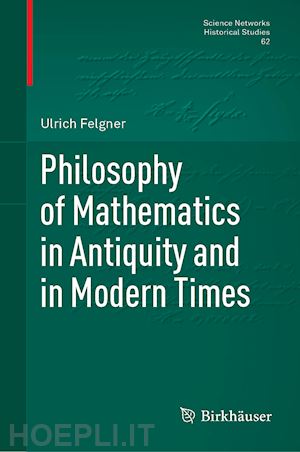
Questo prodotto usufruisce delle SPEDIZIONI GRATIS
selezionando l'opzione Corriere Veloce in fase di ordine.
Pagabile anche con Carta della cultura giovani e del merito, 18App Bonus Cultura e Carta del Docente
»Philosophy of Mathematics« is understood, in this book, as an effort to clarify such questions that mathematics itself raises but cannot answer with its own methods. These include, for example, questions about the ontological status of mathematical objects (e.g., what is the nature of mathematical objects?) and the epistemological status of mathematical theorems (e.g., from what sources do we draw when we prove mathematical theorems?). The answers given by Plato, Aristotle, Euclid, Descartes, Locke, Leibniz, Kant, Cantor, Frege, Dedekind, Hilbert and others will be studied in detail. This will lead us to deep insights, not only into the history of mathematics, but also into the conception of mathematics as it is commonly held in the present time.
The book is a translation from the German, however revised and considerably expanded. Various chapters have been completely rewritten.
The concept of mathematics.- Plato's philosophy of mathematics.- The Aristotelian conception of mathematics.- The axiomatic method of Euclid.- Finitism in Greek mathematics.- The paradoxes of Zeno.- On certainty in mathematics.- The Cartesian nativism, the Prometheus myth, Augustinian illuminism, and Cartesian rationalism.- John Locke's thoughts on mathematics.- Rationalism.- Empiricism in mathematics.- Immanuel Kant's conception of mathematics.- Psychologism in mathematics.- Logicism.- The concept of "set".- Contemporary Platonism.- The problem of non-constructive proofs of existence.- The formal and the contentual position.- Dedekind and the emergence of structuralism.- Hilbert's critical philosophy.- Epilogue.- Index of names.- Index of subjects.- Index of abbreviations.
Ulrich Felgner is a retired professor of mathematics at the University of Tübingen. He studied at the Universities of Giessen, Besancon and Frankfurt/M, received his doctorate in 1968 in Tübingen and habilitated in Heidelberg in 1973. He worked as a Professor at the Universities of Heidelberg, Freiburg and Tübingen. His main areas of research are Algebra, Mathematical Logic, Set Theory, as well as Foundations, History and Philosophy of Mathematics.











Il sito utilizza cookie ed altri strumenti di tracciamento che raccolgono informazioni dal dispositivo dell’utente. Oltre ai cookie tecnici ed analitici aggregati, strettamente necessari per il funzionamento di questo sito web, previo consenso dell’utente possono essere installati cookie di profilazione e marketing e cookie dei social media. Cliccando su “Accetto tutti i cookie” saranno attivate tutte le categorie di cookie. Per accettare solo deterninate categorie di cookie, cliccare invece su “Impostazioni cookie”. Chiudendo il banner o continuando a navigare saranno installati solo cookie tecnici. Per maggiori dettagli, consultare la Cookie Policy.